A little more than a year ago, as the first reports rolled in about the outbreak of a novel new coronavirus in China, it quickly became clear that older individuals and males were most at risk of lethal outcomes.
Yale immunobiologist Akiko Iwasaki knew immediately that studying the disparate immune responses of men and women to the virus that causes COVID-19—and how age affects these responses—might reveal the underlying biology of this mysterious new pathogen.
“Age and sex are where immunological changes intersect,” said Iwasaki, the Waldemar Von Zedtwitz Professor of Immunobiology and Molecular, Cellular and Developmental Biology at Yale and an investigator for the Howard Hughes Medical Institute.
For instance, researchers had just discovered that the gene expression pattern that controls innate immune responses to viral infections, the first line of defense against pathogens, begins to decrease dramatically in men between the ages of 62 and 64. In women, this immune response begins to wane about six years later in life.
Iwasaki’s lab—with support from Women’s Health Research at Yale—quickly launched studies to explore why men are more susceptible than women to SARS-CoV, the virus that causes COVID-19. By April, her lab had completed research detailing the specific molecular differences in the immune system response of men and women, and identified which molecules offered protection and which were associated with poorer outcomes.
Over the last year, Iwasaki and her colleagues from around the globe have compiled a rich literature of research that reveals in detail these and other factors that make the virus more lethal for men.
At the invitation of the journal Science, Iwasaki and Yale research scientist Takehiro Takahashi summarized some of those insights in a paper published on Jan. 21.
So why are men are 1.7 times more likely to die from the virus than women? One of the first explanations, researchers say, comes from basic biology. Women have two X chromosomes, men have one. X chromosomes are important because they are rich in genes that regulate immune response. While one of those X chromosomes in women is silenced, in some cases key genes from both X chromosomes can activate the innate immune system, the early alarm system that detects pathogens. Essentially, women have immune system reinforcements they can call upon early in infections that men, with their single X chromosomes, don’t possess.
Sex hormones also play key roles in susceptibility to bad outcomes, research has shown. In a mouse model of SARS-CoV infection, higher mortality in male mice was observed and attributed to the protective roles of the female sex hormone estrogen. The presence of estrogen can help suppress ACE 2, a receptor on the surface of many cells that is used by SARS-CoV-2 to enter cells. Conversely, the male hormone androgen appears to enhance the ability of the virus to infect cells. A study found that men undergoing androgen deprivation therapy for prostate cancer appear to be less susceptible to infection by the COVID-19 virus.
In addition, age amplifies and sometimes sabotages a man’s immune response to COVID-19 infection. As men in their early 60s begin to lose their ability to mount an initial immune response to the novel coronavirus, often there is also a compensatory overreaction by other immune system molecules that can lead to damaging inflammation, scientists found. These inflammatory factors can trigger the so called “cytokine storm” which can lead to severe damage to lungs and other tissue that is a hallmark of severe COVID-19 cases.
Uncovering the details of differing immune system responses of men and women will inform both vaccine development and better clinical treatments, Iwasaki said.
“I knew we would learn a lot about immunity to this virus by studying sex differences, but I didn’t know the findings would be this clear,” she said. “Hopefully, vaccines will start to level the playing field between men and women and reduce deaths for everyone.”
Bill Hathaway, Yale University


